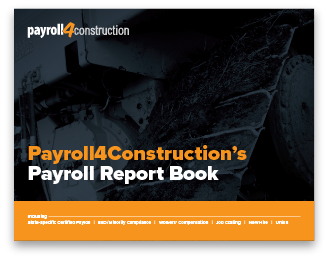Minnesota Prevailing Wage Laws: A Complete Guide for Contractors
Overview of Minnesota Prevailing Wage Laws
Minnesota's prevailing wage laws establish prevailing wage requirements on state-funded construction projects, ensuring contractors and subcontractors pay standardized wages that reflect local labor agreements for similar work.
For any construction company impacted by this law, Payroll4Construction is here. As a complete payroll service, Payroll4Construction is built to keep contractors compliant with certified payroll reporting and prevailing wage rate determinations. Our comprehensive services include automated WH-347 form preparation and submission to ensure full compliance with federal reporting requirements.
Keep reading to learn more about Minnesota's prevailing wage laws and how we can help you.
What is Prevailing Wage in Minnesota?
Minnesota requires contractors and subcontractors in the construction industry to pay prevailing wages on public works projects when the total project cost exceeds specific thresholds. This includes:
- State-funded projects with construction work of $2,500 or more (single trade)
- State-funded projects with construction work of $25,000 or more (multiple trades)
- Highway and heavy construction projects funded by the state
- Minnesota Housing projects with loans of $500,000 or more or grants of $200,000 or more
Under Minnesota Statutes 177.41 through 177.44, construction workers must receive minimum hourly wages and fringe benefits based on local standards for similar work within Minnesota as determined by the Minnesota Department of Labor and Industry (DLI).
Don’t Let Prevailing Wage Compliance
Slow Down Your BusinessPrevailing Wage Rate Determination
Setting Initial Rates
The Minnesota Department of Labor and Industry (DLI) has several crucial responsibilities related to establishing and maintaining prevailing wage rates. These ensure fairness throughout the contracting process.
The DLI must:
- Determine appropriate prevailing wages, including hourly rates and benefit rates
- Publish these rates for use in public works projects
- Include these rates in all project specifications and contracts
- Update rates periodically to reflect current local conditions
Rate Calculation Method
The DLI follows a structured approach to determine fair and accurate compensation rates. They establish rates by analyzing:
- Collective bargaining agreements in the locality
- Actual wages paid on similar construction projects in the area
- Various sources of wage information for the geographic area
- Input from public hearings when necessary
Minnesota maintains separate prevailing wage schedules for highway/heavy construction and building construction projects, reflecting the different skill sets and market conditions in these sectors.
Prevailing Wage Requirements in Minnesota
Prevailing wage laws establish minimum compensation standards for workers on public projects. These requirements ensure fair labor practices and create a level playing field for all contractors bidding on government work.
- Contractor

Contractors bear significant responsibility for ensuring project compliance with prevailing wage regulations. These requirements apply throughout the entire project lifecycle:
- Understanding which projects are subject to Minnesota prevailing wage requirements
- Ensuring all covered workers receive the appropriate prevailing wage rates
- Maintaining detailed payroll records and documentation
- Submitting certified payroll reports as required
- Ensuring all subcontractors comply with prevailing wage obligations
- Paying overtime rates for work exceeding eight hours per day or 40 hours per week
How to Submit Prevailing Wage Proof
Minnesota's prevailing wage law requires contractors to maintain comprehensive payroll documentation to demonstrate compliance with wage and benefit requirements.
This documentation process involves detailed record-keeping of business information and worker compensation, ensuring transparency and accountability.
Information needed for prevailing wage compliance includes:

- Detailed certified payroll records
- Worker classification documentation
- Hourly wage rates paid
- Fringe benefit contributions
- Hours worked (regular and overtime)
- Project information and funding source verification
- Proof of compliance with overtime payment requirements
In essence, contractors need certified payroll records and evidence of proper wage payments for all covered workers on prevailing wage projects. The Minnesota Department of Labor and Industry requires contractors to:
- Maintain accurate payroll records for all covered workers
- Submit certified payroll reports as required by the contracting agency
- Pay prevailing wages including both base wages and fringe benefits
- Comply with overtime requirements (1.5 times base rate for hours over 8 per day or 40 per week)
- Keep all records available for inspection for at least 3 years
This documentation must be maintained throughout the project duration and made available for state inspection upon request. For projects requiring federal compliance, contractors must also complete and submit WH-347 forms to meet federal reporting standards.
Compliance, Enforcement and Consequences
The Minnesota prevailing wage system relies on robust compliance mechanisms and meaningful penalties to ensure all parties adhere to established standards. These measures protect workers' rights, ensuring compliance with wage standards while maintaining the integrity of public projects.
Wage Payment Rules
Prevailing wage laws establish minimum compensation requirements that cannot be circumvented. This ensures workers receive fair pay for their labor on public projects.
The rules surrounding wage payment include:
- Workers must receive Minnesota prevailing rates for their job classification
- Rates include both actual wages and fringe benefits
- Separate rates apply for highway/heavy construction and building construction
- Employers cannot pay below these rates, even with worker consent
- Overtime must be paid at 1.5 times the base rate for hours over 8 per day or 40 per week
- Certified payroll records must be maintained and submitted as required
Violation Consequences
Significant operational and financial repercussions await contractors who fail to comply with prevailing wage requirements, potentially jeopardizing their entire business.
Construction businesses are at risk of penalties, including:
- Investigation and enforcement action by the Minnesota DLI
- Assessment of unpaid back wages to affected workers
- Administrative penalties and fines
- Potential debarment from future state-funded projects
- Civil enforcement actions
- Increased scrutiny on future projects
Prevailing Wage Whistleblower Protections
Minnesota law includes anti-retaliation provisions specifically designed to protect workers who report violations of prevailing wage requirements or certified payroll discrepancies.
Employees are protected from retaliation when reporting prevailing wage violations:
- Protection from termination
- Protection from disciplinary action
- Protection from discrimination
- Protection from threats or harassment
These protections apply specifically to matters involving prevailing wage compliance. They allow workers to safely report underpayment, misclassification, or certified payroll record falsification without fear of employer retaliation.
Penalties
The legal framework includes substantial financial penalties and establishes clear liability structures to encourage compliance.
Financial consequences include:
- Payment of back wages to make up any wage deficiencies
- Administrative penalties as determined by the DLI
- Potential civil penalties for willful violations
- Joint liability between contractors and subcontractors
- Costs associated with DLI investigations and enforcement actions
How Payroll4Construction Helps You Stay Compliant
Payroll4Construction is a construction payroll service that specializes in helping contractors and construction companies navigate the complex wage regulations of prevailing wage laws.
These time-saving services reduce administrative hours spent on complex wage calculations and paperwork. In turn, this gives the team peace of mind knowing that prevailing wage obligations are being handled correctly.
Prevailing Wage Exceptions
Most state-funded construction projects in Minnesota must adhere to prevailing wage laws. However, certain exemptions exist under specific circumstances.
These exemptions don't release contractors from fair wage obligations. Instead, the exemptions allow them to follow alternative regulatory frameworks that still maintain worker protections and compensation standards.
Projects may be exempt from Minnesota prevailing wage requirements if they:
Fall below the monetary threshold:
- Under $2,500 for single-trade projects
- Under $25,000 for multiple-trade projects
Follow the federal Davis-Bacon Act requirements because the job receives federal funding:
- The Davis-Bacon Act establishes its own prevailing wage determination system
- Contractors must still maintain detailed, accurate records for payroll
- Federal wage classifications may differ from state calculations but maintain worker protections
- Compliance with federal standards requires the same rigorous documentation and enforcement
Qualify for specific statutory exemptions such as:
- Certain volunteer work
- Emergency repair work
- Specific projects explicitly exempted by law
- Certain types of material suppliers
In all cases, contractors remain responsible for understanding which wage standards apply to their projects. When in doubt, following the higher wage standard ensures compliance with all applicable regulations.



